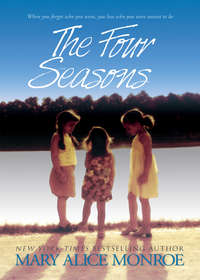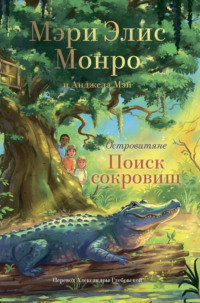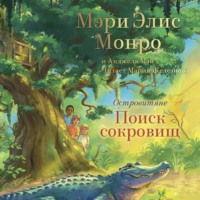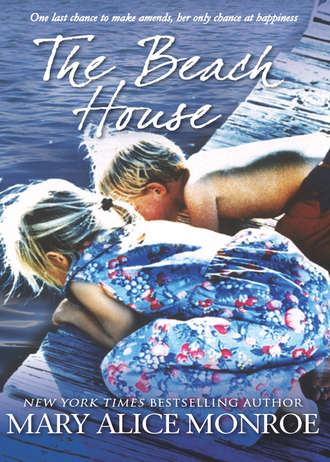
Полная версия
The Beach House

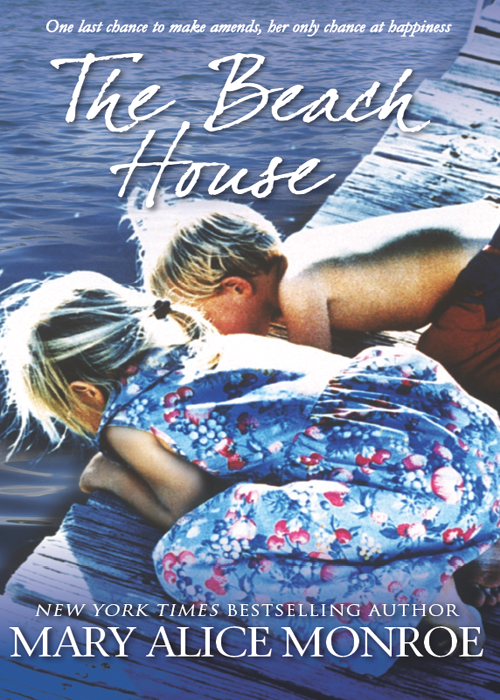
Praise for the novels of
MARY ALICE MONROE
“Readers who enjoy such fine southern voices as Pat Conroy will add the talented Monroe to their list of favorites.”
—Booklist on Sweetgrass
“Skyward is a soaring, passionate story of loneliness and pain and the simple ability of love to heal and transcend both.”
—Anne Rivers Siddons
“Mary Alice Monroe is helping to redefine the beauty and magic of the Carolina Lowcountry. Every book she has written has felt like a homecoming to me.”
—Pat Conroy, author of The Prince of Tides and Beach Music
“A devoted naturalist and native of South Carolina’s Low Country, Monroe is in her element when describing the wonders of nature and the ways people relate to it…. Hauntingly beautiful relationships between birds and people add texture to the story…. Monroe successfully combines elements of women’s fiction and romance in this lyrical tale.”
—Publishers Weekly on Skyward
“Mary Alice Monroe writes from her heart to the hearts of her readers. It is a quality of emotional honesty together with lyrical, descriptive passages that draw her audience to books like The Four Seasons.”
—Charleston Post & Courier
“Monroe writes with a crisp precision and narrative energy that will keep them turning the pages. Her talent for infusing her characters with warmth and vitality and her ability to spin a tale with emotional depth will earn her a broad spectrum of readers, particularly fans of Barbara Delinsky and Nora Roberts.”
—Publishers Weekly on The Four Seasons
“With novels like this one and The Book Club, Mary Alice Monroe continues to be one of the leaders of complex female relationship dramas that hit home to the audience.”
—Midwest Book Review on The Four Seasons
“The Book Club skillfully weaves the individual story threads into a warm, unified whole that will appeal to readers who enjoy multifaceted relationship novels with strong women protagonists.”
—Library Journal
“What price beauty? Mary Alice Monroe’s Girl in the Mirror reflects the shadows and shapes of a woman’s painful and illuminating journey of self-discovery, of choice, of loves.”
—Nora Roberts
“Monroe’s novel is a fascinating, emotion-filled narrative that’s not to be missed.”
—Booklist, starred review, on Skyward
New York Times bestselling author
Mary Alice Monroe
The Beach House

www.mirabooks.co.uk
This book is dedicated
to my fellow members of the
Isle of Palms/Sullivan’s Island Turtle Team:
Mary Pringle, Mary Ellen Rogers,
Beverly Ballow, Barb Bergwerf,
Nancy Hauser, Tee Johannes,
Marge Millman, Susan North,
Kathey O’Connor, Wanda Parker,
Grace and Glenn Rhodes, Sara Saylor
And to all Turtle Volunteers here and elsewhere
who walk the beaches every morning
to help our beloved loggerheads.
ACKNOWLEDGMENTS
This is the first time I’ve written about two subjects dear to my heart: the loggerhead sea turtles and the Isle of Palms. I’d like to thank the following people for their help with this book that is special to me.
For sharing her knowledge, lending me books, videos and pamphlets, and for answering my countless questions not only about sea turtles but about a zillion other things that would take me too long to list, love and thanks to my dear friend and Turtle Team guru, Mary Pringle.
I am indebted to Charlotte and Ken Tarr for all their valuable help with important plot points and for their tireless and continuous support of me and my books.
Once again, thanks to Julie Beard for editing, wonderful critiques and for just listening.
For art and cover designs, story editing and helping me get to the heart of my heroines, thank you, Marguerite Martino.
A special thanks to Shane Ziegler of Barrier Island Eco Tours, Isle of Palms, for sharing his invaluable insights and vast knowledge about the Lowcountry, its wildlife and ecosystem. And the tours are fabulous!
Barb Bergwerf’s incredible photographs of so many aspects of our efforts with the loggerheads were inspiring to me as I wrote during the “off” season. Thank you!
I’m blessed with a brilliant editor who helps me bring out the best in my books. Thanks to Martha Keenan, a lovely lady in every way.
As always, I’m grateful to my agent, Karen Solem, for all her insightful comments and for knowing when I needed a smile and enthusiasm.
For filling in the gaps for me while I was madly writing, for loads of support and for just being great and treasured friends, sincere thanks to Cynthia Pearlman, Susan North, Carolyn Graf, Ann Nodtvedt, Buzzy Porter, Marge Irizarry, Dottie Ashley, Sally Marschner, Tim Brewerton, Therese Killeen, Lisa and Barry Hand, Terri Ehlinger, Amy Rowe, Elizabeth Carota, Stacy Harwood, Marsha Iafrat, Clay and Martha Cable, Danny and Lena Johnson, Angela Jones, David Tekler, Susan Shimmin, Tamar Myers, Nina Bruhns, Dave and the gang at the Isle of Palms post office, the people of Isle of Palms and, of course, the Turtle Team.
For tech support, big thanks to Jon D. McCandlish.
Special thanks to the South Carolina Department of Natural Resources, Wildlife Diversity Section. In particular, Sally Murphy, Meg Hoyle and Charles Tambiah for an education on loggerheads.
It was a treat for me to learn about the early days of being a “Turtle Lady” from one of the originals, Florence Johnson, and I am very grateful.
Thank you to the Isle of Palms Police Department and the Charleston County Red Cross for advising me on hurricane evacuation procedures.
Lastly, heartfelt love and thanks to my family. To Markus, for advice and long walks on the beach while I hammered out story points. To Claire, for trying to explain the finer points of my computer. To Gretta, for insights into the mind of an eighteen-year-old girl. Lastly, to Zack, whose smile brightens up each day.
CONSIDER THE TURTLE
Consider the turtle. Perchance you have worried, despaired of the world, meditated the end of life, and all things seem rushing to destruction; but nature has steadily and serenely advanced with the turtle’s pace. The young turtle spends its infancy within its shell. It gets experience and learns the way of the world through that wall. While it rests warily on the edge of its hole, rash schemes are undertaken by men and fail. French empires rise or fall, but the turtle is developed only so fast. What’s a summer? Time for a turtle’s egg to hatch. So is the turtle developed, fitted to endure, for he outlives twenty French dynasties. One turtle knows several Napoleons. They have no worries, have no cares, yet has not the great world existed for them as much as for you?
—Henry David Thoreau
Journal
August 28, 1856
CONTENTS
PROLOGUE
CHAPTER ONE
CHAPTER TWO
CHAPTER THREE
CHAPTER FOUR
CHAPTER FIVE
CHAPTER SIX
CHAPTER SEVEN
CHAPTER EIGHT
CHAPTER NINE
CHAPTER TEN
CHAPTER ELEVEN
CHAPTER TWELVE
CHAPTER THIRTEEN
CHAPTER FOURTEEN
CHAPTER FIFTEEN
CHAPTER SIXTEEN
CHAPTER SEVENTEEN
CHAPTER EIGHTEEN
CHAPTER NINETEEN
CHAPTER TWENTY
CHAPTER TWENTY-ONE
CHAPTER TWENTY-TWO
CHAPTER TWENTY-THREE
CHAPTER TWENTY-FOUR
CHAPTER TWENTY-FIVE
CHAPTER TWENTY-SIX
CHAPTER TWENTY-SEVEN
loggerhead. 1. Latin: Caretta caretta. A tropical sea turtle with a hard shell and a large head.
2. a stupid fellow; blockhead.
3. at loggerheads; in disagreement; in a quarrel.
PROLOGUE
It was twilight and a brilliant red sun lazily made its hazy descent off the South Carolina coast. Lovie Rutledge stood alone on a small, rolling sand dune and watched as two young children with hair the same sandy color as the beach squealed and cavorted, playing the age-old game of tag with the sea. A shaky half smile lifted the corners of her mouth. The boy couldn’t have been more than four years of age yet he was aggressively charging the water, the stick in his hand pointing outward like a sword. Then, turning on his heel, he ran back up the beach, chased by a wave. Poor fellow was tagged more often than not. But the girl…Was she seven or eight? Now there was a skilled player. She danced on tiptoe, getting daringly close to the foamy wave, instinctively knowing the second to back away, taunting the water with her high laugh.
How like her own Cara, Lovie thought, recalling her youngest. Then, seeing a rogue wave wash over the boy, toppling him and leaving him sputtering with rage, she chuckled. And how like her son, Palmer. Not far away, the children’s young mother was bent at the waist busily gathering up the carelessly thrown buckets and spades into a canvas bag and shaking sand from towels, eager to pack up and go.
Stop what you’re doing and observe your children! Lovie wanted to say to the young mother. Quick, set aside your chores and turn your head. See how they laugh with such abandon? Only the very young can laugh like that. Look how they are giving you clues to who they are. Treasure these moments! Savor them. For they will disappear as quickly as the setting sun. And then, before you know it, you will be like me—an old woman, alone and willing to trade anything and everything for one soft evening such as this with her babies once again.
She wrapped her arms around herself and sighed. “Lovie, you do go on,” she told herself with a shake of her head. Of course she wouldn’t tell the young mother this. It would be rude, and of no use. The mother was harried, her mind filled with all she had yet to do. She wouldn’t understand Lovie’s warning until her own children were grown and gone. One day she would recall this very twilit evening and the sight of her children dancing on the shore and then…Yes, then she would wish she had stopped to hold their chubby hands and play tag along with them.
Lovie continued to watch the scene unfold in its predictable manner. The towels were shaken and folded, then stuffed into the bag, the children were called in from the water’s edge and, as the sky darkened, the mother led her tired soldiers in a ragtag formation over the dune and out of sight.
Silence reigned once again on the familiar stretch of beach. Another day was done. Along the water’s edge a sandpiper peeped as it skitted across the sand and foam line in its straight-legged manner. Behind Lovie, the tall grasses swayed in the evening breeze. She closed her eyes, acutely attuned to the night music. There would only be a few more quiet nights like this. It was mid-May and the tourist season would soon go into full swing on the South Carolina coast.
Soon, too, her beloved sea turtles would be arriving.
She peered out for a long while at the sea as the sky darkened around her. Somewhere out in the distant swells that rolled and dipped with the winds she sensed a loggerhead was biding her time. Waiting until some powerful instinct told her that the moment was right to venture ashore. Every summer for more years than she could recall Lovie had done whatever she could to help the loggerheads through the nesting season. This summer’s group of mothers might even include hatchlings she’d helped scramble to the sea twenty years earlier. She smiled at the thought.
Lovie walked to the water’s edge, right to where the sea stretched to her toes. When she was young—oh, so many years ago—she, too, used to giggle and run away in that timeless game of sea tag. As did her children and grandchildren. But she and the sea were old friends now and tonight she hadn’t come to play. Rather, she’d come to her old friend for solace. She stood motionless, feeling each swirl about her ankles as a caress, hearing the gentle roar of the surf as loving whispers. There, there…
Tears filled her eyes. Seeing the mother and her young children brought back images that were both joyous and heartbreaking. The years had flown by too swiftly, slipping away like sand through her fingers. She lifted her chin and wiped away the tear from her cheek. The vast blue ahead stretched out seemingly to infinity. This was no time for tears, she chided herself. She was old enough to know that life, like the sea, didn’t always play fair. Yet she’d always believed that if she played by the rules, if she persevered, one day she’d have time enough to…
To do what, she asked herself, shaken? She was still unclear as to what exactly was missing in her relationship with her children. Her daughter, especially. When they were young, Cara and Palmer had played together under her watchful eye on this very same stretch of beach. They’d been close then, had such good times together. But now her children were grown-up and she felt every inch of the distance between them, stretching further over the years.
She turned to walk up the beach toward three lots that remained vacant on this stretch of valuable real estate and climbed the small dune. Beyond the lots she could see her beach house perched on a distant dune like a tiny island, nearly obscured from view by a row of gangly oleanders. Its once vibrant yellow color was stripped by sunshine and leached into the gala of yellow primroses that grew wild over the dunes. All the angles, corners and quaint panes of glass of the cottage were dear to her. Primrose Cottage was more than a beach house. It was a touchstone. A place of sunshine and happiness, for her and for her children.
Lovie stood alone gazing toward the west. The day’s light extinguished and the night grew dark and silent save for the clicking of the swaying sea oats and the gentle lapping of waves along the shore. As ghosts of the past rose up to swirl in the hallucinatory colors of twilight, she sighed deeply, clasping her hands tight in front of her as one in prayer. She was nearly seventy years old. There was no time left for regret or misgivings, no time for dreams of what might have been. There were plans to be made. The beach house—and all the secrets it held—had to be placed in secure hands. Too much had been sacrificed for too many years to let the secrets slip out now. Too many reputations were at stake.
She had but one hope.
“Lord,” she prayed, her voice raspy in her tight throat. “I’m not here to complain. You know me better than that after all this time. But the Bible says You never close a door without opening a window. So I’m praying for You to open the window. You know how things are between Cara and me. It will probably take a miracle to make peace. But You’re famous for those, so I’m hopeful. Please, Lord, that’s all I’m asking for. Not more time. I’d go willingly if I knew things were settled here before I left.” She smiled ruefully. “I’m going whether it’s willingly or not—I know that, too.” Her smile fell as she grimaced in pain. “Please, Lord, answer this one small prayer. Not just for me, but for Cara. Help me play with my child once more before I die. Bring my Cara home.”
After living at sea for twenty years or more, the female loggerhead returns to the beach of her birth to nest. She travels hundreds of miles through the Atlantic, her three-hundred-pound, reddish-brown carapace filled with hundreds of fertile eggs.
CHAPTER ONE
C ara had begun this long journey home many times in her mind over the years, but always there was some project, some appointment, some emotional obstacle of her own construction that stopped her.
Road weary and life tired, Cara was traveling the path of least resistance as she headed south across the flat expanse of the old cotton country known as the coastal plains. It had been over twenty years since she’d driven this long stretch of South Carolina highway toward the sea. Growing up, she’d always considered it someplace to drive through on her way to somewhere else. Anywhere else.
She passed vanishing woodlands and acres of farmland for sale, huge, flat-roofed warehouses and sun-faded billboards heralding exits for boiled peanuts, tree-ripened peaches, stock car racing and fireworks. It was late May. Spring was already giving way to sizzling summer in the South. Elderberry bushes rambled along the roadsides, and beyond in the pinewoods, Cara knew the coral beans were aflame and swamp roses decorated the banks like some wild hothouse garden.
The thought that the sea turtles were returning home to nest sprang to mind. She laughed out loud at the irony.
If someone had told her a year ago that the following May she would be driving to Charleston for an extended visit with her mother, Cara would have tossed back her head and laughed in that throaty manner of hers. “Impossible,” she would have told them, the smile slipping from her face and a flash sparking in her eyes. First of all, her schedule would never have allowed it. Every minute of her day was double booked. At best, in an emergency, she might fly in for an overnight stop, as she had for her father’s funeral. Secondly, there was nowhere on earth she’d least want to visit than Charleston. And no person less than her mother. The current status of a polite truce had worked well for them both over the past years of her self-imposed exile.
But, as always, Mama’s timing was impeccable. Where else would one go but home when there was nowhere else to go?
Cara tightened her grip on the steering wheel. How could her orderly life have careened so far out of control? How did it happen that, after twenty-two years of living independently, after a successful career, after complete and utter self-sufficiency, she found herself back on this damnable stretch of road limping back home?
It was her mother’s letter that had lured her. The day before, Lovie had sent the customary flowers for Cara’s birthday. As Cara gingerly unwrapped the purple florist tissue, the heady scent of the gardenias permeated her apartment. Instantly, Cara was back in her mother’s walled garden in Charleston where an ancient magnolia spread its broad glossy leaves and the white, heavily scented flowers of the gardenias competed with the climbing jasmine. She’d opened the letter from her mother and read her familiar, feathery script.
,!
Happy Birthday Dear Caretta!
I never smell gardenias without thinking of you.
Things have been in a state of flux since your father’s death. Now it is time for me to, shall we say, put my house in order. Come home, Cara, just for a while. Not to the house on Tradd Street. Come to the beach house. We’ve always had the best times there, haven’t we?
Please don’t say that you are too busy or that you can’t get away. Remember how we used to say “Take charge of your birthday”? Can’t you grant yourself this one gift of time and spend a few days with your ancient mother? Please come home, Cara dear. Soon. Your father is gone and we need to sort through years of accumulation.
Love,
Mama
Perhaps it was the scent of the gardenias that prompted the sudden loneliness, or simply that someone had remembered her birthday. Or perhaps it was her desolation at having just lost her job. But for the first time since leaving her embrace at eighteen, Cara felt a sudden, desperate longing for her mother.
She wanted to go home. Home to the Lowcountry, where once she had been happy.
Cara crossed the Ashley and the Wando rivers, took a final turn off the highway, then sped over a new, graceful arch of roadway that connected the mainland to the small barrier island called Isle of Palms. The vista yawned open before her, revealing a breathtaking view of endless blue sky and watery, greening marsh stretched out as far as she could see. She felt her mind ease as she took in the wide-open space. The hustle and honking of the crowded roads felt a world behind her. Ahead, cutting a wide, blue path through the waving grasses, was the sparkling Intracoastal Waterway and parallel to it, the smaller Hamlin Creek lined with docks, one after another, most with a boat at moor. She reached the peak of the arch.
Suddenly, looming straight ahead, like a magnificent yet serene beast, lay the vast, glistening expanse of blue that was the Atlantic Ocean. It was a living thing, pulsating power beneath the quiescent surface. Her breath caught, her body shivered and in that soul-striking instant, Cara knew that saltwater still ran thick in her veins.
She was back on the Isle of Palms. Even the name was soft on the tongue and evoked images of waving palm trees and tranquil, sunny afternoons by the rolling surf. For a hundred years, the Isle of Palms was a place the folks of Charleston and Columbia escaped to when the summers got too beastly hot. They took the ferryboat over to camp in the pine and oak forests or dance at the pavilion to big-name bands. Years later, bridges and roads were built and each summer the island’s population swelled along with the heat. Growing up, Cara had spent summer after summer here with her mother and her older brother, Palmer. Her happiest memories were of the three of them living without paying mind to a clock, letting the sultry light of the Carolina sun dictate their days.
She’d heard that back in 1989 Hurricane Hugo had turned the island upside down. But she hadn’t imagined the extent that time could alter a landscape. This used to be a sleepy island town with a grocer, liquor and hardware store clustered together beside a small stretch of post-cardish, islandy restaurants. Ocean Boulevard was but a line of modest beach cottages across from a wide stretch of sand dunes that rolled lazily along the ocean.
So it was all the more shocking to see that the dunes she’d played on were gone, paved flat for a row of mansions that formed a wall of pastel-colored wood blocking the view of the sea and dwarfing the once oceanfront cottages across the street. These beautiful new post-Hugo houses stood even closer to the water’s edge, as though arrogantly daring the heavens to strike again. Cara could turn her head left, then right as she drove and see, in turn, an eerie picture of pre-and post-Hugo worlds.
Still, some things never changed, she thought as she spied a line of pelicans flying overhead looking like a squadron of bombardiers on patrol. She opened her window to the balmy island air and breathed deeply. Dusk was setting in, and with each moist breeze she felt a page of her history flutter back, recalling the days when she was young and pedaled this road on her bicycle, feeling the wind toss her hair like streamers behind her. She drove another two blocks south, scanning. Her breath caught in her throat when she saw it.
Primrose Cottage. As pale a yellow as the delicate evening primroses that surrounded it, the 1930s beach cottage sat back from the road perched on a small dune. In contrast to all the meticulously landscaped properties of the newer mansions, her mother’s house appeared as a wispy memory of the past glowing in the twilight among waves of tall grasses, brilliant pink phlox and yellow primroses for which it had been named. Although a bit wind worn, the old frame house with the low spreading roof and the wide, welcoming verandas seemed as indigenous here as the palmetto trees. It had been twenty years since she’d laid eyes on this house. So many years since embarking on the journey from little girl to middle-aged woman. Pulling up to the curb to stare, it occurred to her that while she’d been busy with her life in Chicago, oblivious to the goings-on of the island, this charming little house was here, patiently waiting for her.






